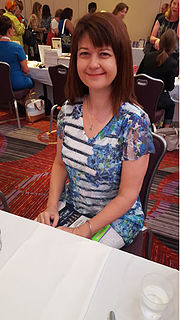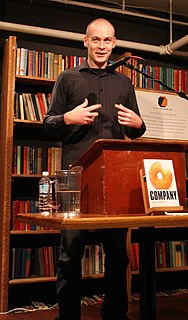A Quote by Robert J. Sawyer
Writing is transmogrifying, not just for the reader but also for the author; an author becomes someone he or she isn't by living the lives of his or her characters.
Related Quotes
I spent many years writing and directing in radio drama, so I am comfortable with an audience or a microphone, but I do worry about the blurring of an author's public persona with the work itself. A good 'performer' can make a mediocre book sound strong, and a shy author can leave listeners missing the excellence of his or her writing.
Someone from the Internet Writing Workshop sent me a link to the Gender Genie, where you paste in a section of text and it uses an algorithm to detect whether the author is male or female. Or, if you're an author, you can tell whether you're really nailing your opposite-sex characters. I mean, nailing their dialog.
I learned to write from reading. I had no writing classes. It's part of my thinking as the writer-author, reading, but then I also want to bring this into my characters, who also read and think. There's that great quote from Virginia Woolf - it's very simple: "...books continue each other." I think when you're a writer, you're also, hopefully, a reader, and you're bringing those earlier works into your work.
There is no obligation for the author of a film to believe in, or to sympathise with, the moral behaviour of his characters. Nor is he necessarily to be accredited with the same opinions as his characters. Nor is it necessary or obligatory for him to believe in the tenet of his construction - all of which is a disclaimer to the notion that the author of Drowning by Numbers believes that all men are weak, enfeebled, loutish, boorish and generally inadequate and incompetent as partners for women. But it's a thought.




































